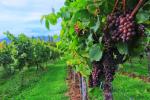Horizon Europe IsWINE Project: Isotopic geochemistry for the conservation of water ponds in vineyards
- Type Project
- Status Signed
- Execution 2024 -2027
- Assigned Budget 257.235,36 €
- Scope Europeo
- Main source of financing Horizon Europe 2021-2027
- Project website Proyecto IsWINE
Changes in precipitation patterns across the EU pose significant challenges to the wine sector, jeopardizing its stability and productivity. As extreme weather events become more frequent, vineyards struggle to adapt to changing climate conditions. This urgent need for adaptation is driving the European wine industry to seek innovative solutions to ensure its resilience. Supported by the Marie Skłodowska-Curie Actions (MSCA) program, the IsWINE project will quantify the impact of land management on vineyard water resources. Inspired by sustainable practices in New Zealand, the project will conduct pilot projects in northern Spain and New Zealand. It uses isotopic geochemistry to assess soil moisture, vine water uptake, and water use efficiency.
Inspired by New Zealand's sustainable practices, the project will conduct pilot projects in northern Spain and New Zealand. It uses isotopic geochemistry to assess soil moisture, vine water uptake, and water use efficiency.
In the EU, changes in precipitation patterns pose challenges for the wine sector, urging it to adapt to changing climate conditions. iSWINE aims to quantify the impact of land management practices on vineyard water availability, providing valuable insights into climate change adaptation. As European winegrowers increasingly recognize the urgency of aligning sustainability practices with economic viability and grape quality, New Zealand vineyards stand out as role models, demonstrating their long-standing commitment to sustainability.
At the intersection of environmental and agricultural sciences, IsWINE will establish two pilots, one in northern Spain and one in New Zealand, to empirically test the correlation between different land management practices and soil moisture, vine water uptake, and vine water use efficiency using isotope geochemistry. This approach will enable significant insights into vineyard resilience and cross-learning between the two regions. EU wine stakeholders will be involved in defining adaptive management measures resulting from the pilots, thereby delivering tangible solutions aligned with the sector.
By generating practical knowledge, IsWINE can provide European vineyards with adaptation measures to balance environmental management and agricultural productivity. These efforts are aligned with the European Green Deal and the Common Agricultural Policy, supporting numerous strategies and two EU Missions of Member States. IsWINE will be organized by three highly qualified institutions.
The outbound phase (24 months) will take place at the University of Auckland under the supervision of Asso. Prof. Luitgard Schwendenmann, the return phase (12 months) will be carried out at the Neiker Technology Centre under the supervision of Dr. Ana Aizpurua, and a secondment stay (3 months) will be carried out at the University of Barcelona under the supervision of Dr. Adrià Barbeta.
The Data Management Plan describes the data management lifecycle for all datasets that will be collected, processed, or generated within the framework of the action. It describes what data will be collected, processed, or generated, the methodology and standards that will be applied, whether they will be shared or made public, and how they will be managed and retained.
- NEIKER-INSTITUTO VASCO DE INVESTIGACION Y DESARROLLO AGRARIO SA (NEIKER)







